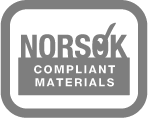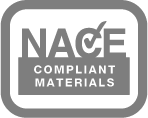Get in-stock reciprocating seals, delivered fast.
The custom-engineered Bal Seal® spring-energized seal sets new standards for performance and reliability in reciprocating applications. Precision machined from PTFE and other premium polymers, our seal combines innovative geometries with a wear-reducing spring energizer to extend the service life of the critical equipment you design.
Reciprocating Piston Seal Profiles
When you’re sealing in reciprocating applications, pressure is a primary consideration. Here’s a small sampling of the thousands of profiles we’ve engineered for specific pressure requirements.
High Pressure Sealing
Designed for pressures of 20,000 PSI+ (1379 bar), this seal features a robust jacket geometry and a heel zone that protects against extrusion. A high force canted coil spring energizer maintains a constant sealing force against the shaft and bore.

Medium Pressure Sealing
At pressures up to 10,000 PSI (689 bar),this seal offers improved stability and sealing effectiveness. It features an anti-extrusion heel design, and incorporates a canted coil spring energizer for more consistent performance.

Low Pressure Sealing
Featuring a short dynamic sealing lip for improved reciprocating service, this seal is ideal for pressures up to 3000 PSI (207 bar). Its geometry minimizes friction and heat buildup for longer service life.

Designs are provided as examples only. By precisely adjusting lip and heel geometries, energizer forces, and material formulations, we’ll create a solution that meets your unique reciprocating sealing requirements.
Reciprocating Piston Seal Materials
The Bal Seal® spring-energized reciprocating seal gives you the ability to closely control frictional forces and optimize sealing effectiveness in a broad range of chemicals, temperatures, and pressures. Base jacket materials consist of polytetrafluoroethylene (PTFE), polyethylene (PE), polyetheretherketone (PEEK), and other specialty polymers. We combine these with advanced filler materials to enhance performance properties. Here’s a small sampling of the materials we’ve formulated for specific reciprocating application requirements.
Excellent wear resistance in various gases, Low abrasion to dynamic surfaces and soft mating materials (aluminum, mild steel, brass, plastics), FDA compliant
Light-duty service, Low friction, Very good chemical compatibility, Good wear resistance in liquids, humid conditions
Severe service conditions, Excellent performance in applications with high pressure, low speed, and high temperature
Severe dry and liquid service, Excellent wear and extrusion resistance in liquids, inert gases, and vacuum
Superior heat and wear resistance, Performs well in high or low speed applications when running against soft metals
Ideal for contact with housings made from soft metal or plastic, Performs well in high-speed, low pressure applications
Light-duty service, Low friction, Excellent chemical compatibility, FDA compliant
High purity, High wear resistance in water and aqueous solutions, FDA compliant
Ideal for bearing seals and backup ring applications, Tolerance for high temperatures and pressures, Excellent chemical compatibility
Reciprocating Piston Seal Energizers
At the heart of almost every Bal Seal® reciprocating seal is an energizer that’s precision-engineered to promote even wear and longer seal service life. Choosing the right energizer – with the ideal combination of force, fit, and finish – is as critical to the success of your design as the seal material itself.

Bal Spring®
Canted Coil Spring Energizer
Friction: Low
Sealing Force: Low

Bal Spring®
Canted Coil Spring Energizer
Friction: Moderate
Sealing Force: Moderate

Bal Spring®
Canted Coil Spring Energizer
Friction: High
Sealing Force: High

Bal Spring®
Helical Spring Energizer
Friction: High
Sealing Force: High

Bal Spring®
Cantilever Spring Energizer
Friction: High
Sealing Force: High

Elastomeric O-Ring Energizer
Friction: High
Sealing Force: High
Spring Energizer Force
The Bal Spring® canted coil spring exhibits a unique deflection and force behavior when it’s compressed. Unlike typical spring technologies, our spring exerts a near-constant force across the working deflection range, and its forces remain consistent – even in wide temperature ranges. It resists compression set, and its individual coils compensate for misalignment, tolerance variations, and surface irregularities.

A variety of spring energizer materials are available to meet chemical, temperature, and galvanic compatibility requirements
STAINLESS STEEL (302, 316, 316L) | MP35N® | PLATINUM IRIDIUM | TITANIUM | HASTELLOY® | INCONEL® | BERYLLIUM-COPPER | ZIRCONIUM-COPPER
Reciprocating Piston Seal Sizes
We produce our Bal Seal spring-energized seals for reciprocating applications in sizes ranging from 0.030 in. (.762 mm) to 120 in. (304.8 cm) inside diameter.

Reciprocating Piston Seal Service Conditions
Temperature, pressure, speed, and media. These are just a few of the major factors you’ll need to consider when choosing a seal for reciprocating applications. Our nearly limitless combination of seal materials, energizers, and geometries – coupled with our consultative engineering approach – will help you address all of them, and create a solution that sets your designs apart. Here’s a look at how our Bal Seal® spring-energized seal performs under a variety of conditions.
Pressure Resistance
(thousand pounds per square inch)

Vacuum Resistance
(Torr)

Temperature Resistance
(° fahrenheit)

Surface Speed
(feet per minute)

Frictional Values
(at ambient temperature)

Seal Media Compatibility

Locking & Anti-Extrusion Devices
For applications requiring an added level of protection, we can integrate an engineered metal locking ring into the Bal Seal® spring-energized seal design. The locking ring prevents rotation of the seal in the hardware, and it promotes consistent sealing contact under thermal cycling conditions. Backup devices made from PEEK and other materials can be designed to integrate with the seal jacket geometry, or they can be provided as separate parts.


















